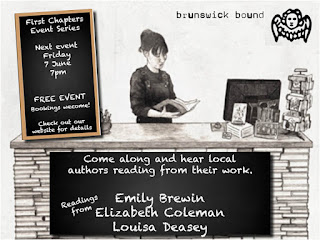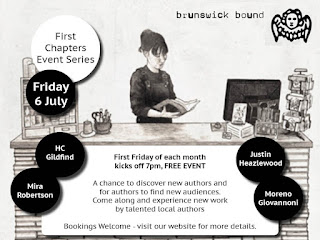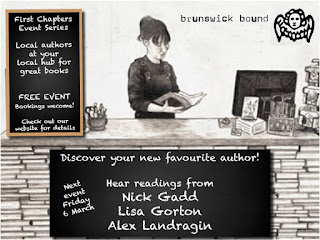First Chapters Q&A with Emily Brewin
Emily Brewin is a Melbourne-based author and educator. She has been
awarded an Australian Society of Authors Emerging Writers' and Illustrators'
Mentorship for her fiction writing, and has been shortlisted for Hachette Australia's
Manuscript Development Program and Varuna's Publisher Introduction Program. She
was recently awarded a 2018 Moreland writer's residency and a 2018 Bundanon
Trust artist residency to develop her third novel, The Piano.
Emily's short stories have been short listed for
a number of literary awards, including the 2017 Bristol Short Story Prize, Alan
Marshall Short Story Award, Overland's Fair Australia Prize and the Elyne
Mitchell Writing Awards. Her work has been published in Feminartsy, Meanjin, Kill Your Darlings, Mamamia, Shine, Metro and Screen
Education magazines.
1. Brunswick Bound has
asked you to read a piece from your published work. Tell us what we can
expect from the piece you have chosen?
Small Blessings is
a twin narrative told from two very different women’s point of view. Rosie is a fighter,
who’s survived drug addiction and an abusive relationship and is doing her best
to make a better life for her son, Petey, who is on the autism spectrum. Isobel
is seemingly Rosie’s opposite, with her successful career and affluent
lifestyle. However, both women are struggling in their own ways. Motherhood is
a major theme throughout the book. These two chapters provide insight to Rosie
and Isobel’s experience of it.
2. How would you
describe the kind of books that you write?
 I write social realist fiction – that is books that deal with
or are based around real social issues such as the forced adoptions that
occurred in the 1950 -70s (Hello, Goodbye)
or domestic violence and addiction (Small Blessings).
I write social realist fiction – that is books that deal with
or are based around real social issues such as the forced adoptions that
occurred in the 1950 -70s (Hello, Goodbye)
or domestic violence and addiction (Small Blessings).
I like to think that fiction is a way of exploring these
issues, of drawing readers’ attention to them through my characters’
experiences. Fiction encourages empathy in people by having them stand in
others’ shoes.
3. What was the first
book that you read (or had read to you) that left an impression on you?
I recall being read and reading Jan Ormerod’s two wordless
picture books, Sunshine and Moonlight. They were very simple stories
that followed a little girl getting up in the morning (Sunshine) and then the nightly ritual of her going to bed at night
(Moonlight).
Both books are beautifully illustrated, but the thing I
remember most is how familiar this little girl and her family were – they
reminded me of my family and the small domestic rituals that were performed in
our house day-in, day-out, which made me feel safe and loved.
4. Do you believe that
books should answer life’s big questions?
I don’t think so. I believe books mean different things to
different readers, and therefore may or may not answer their particular life
questions.
Saying this, stories are
constructed around universal themes (sometimes on purpose, other times not)
that readers recognise, such as love, friendship and loss. Readers may relate
to these themes, recognise them in their own lives, find truth, answers and
comfort in them, or they might just enjoy a book being a ripping read.
5. Do you have any
writing quirks?
I don’t know if I have writing quirks necessarily but I do
have a writing routine, especially in the early mornings when my brain is on
auto-pilot. When my alarm goes off at 5am, I stumble into the kitchen, turn the
kettle on and raid the biscuit barrel as I plug my computer in. The sugary
goodness wakes me up and makes me feel better about getting out of bed while
the rest of the house is sleeping. It’s even better if there’s chocolate in the
pantry. Nothing gets the creative juices flowing like chocolate.
6. What is your favourite word or phrase?
I’m not religious but I love the biblical phrase, ‘Let there
be light; and there was light.’ It conjures an image of sudden illumination;
one that forces all the shadowy things, be they fear, darkness or injustice
etc, away. My first novel, Hello, Goodbye was originally titled, And Then There Was Light in reference to
my main character’s personal and political awakening.
7. What have you found
most surprising about publishing a book?
By the time a book is written I feel as if I know my
characters, their motivations and stories inside-out. It’s always surprising
then to hear other people’s take on them. For instance, some readers have told
me they find one of my protagonists in Small Blessings, Isobel, unlikeable. While I think Isobel behaves selfishly a
times, her behaviour is a protective mechanism caused by childhood bullying and,
I feel, is therefore justified. I did however find her more difficult to write than
my other main character, Rosie, and wonder if this is because I felt less
empathy for her.
8. What is the question
that you hope never to be asked in an author Q&A?
How much money have you made from writing books? It’s too
depressing to think or talk about…
9. What question do
you hope you will be asked and why?
Why do you write books if there’s no money in them?
I think it’s important to pursue interests that bring meaning
to our lives. So much value is placed on financial success that it’s easy to
forget that some of the things that make us happiest are not reliant on
material factors, but on personal satisfaction instead.
10. Which author that
you have read do you think should be better known or more widely read?
Find out more about the First Chapters event series on the Brunswick Bound website.




Comments
Post a Comment